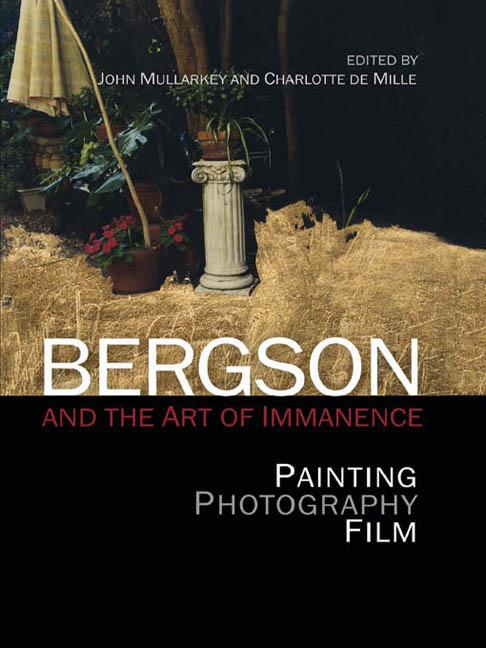Book contents
- Frontmatter
- Contents
- List of Illustrations
- Notes on Contributors
- Introduction: Art's Philosophy – Bergson and Immanence
- Part I Bergson, Art, History
- 1 Bergson, History and Ontology
- 2 Art History, Immanently
- 3 Art History, Less Its Conditions of Possibility: Following Bergson's ‘Le Possible et le réel’
- 4 Matisse, Bergson, Oiticica, etc.
- 5 Bergson Before Deleuze: How to Read Informel Painting
- 6 Revolutionary Immanence: Bergson Among the Anarchists
- Part II Unconditional Practice
- Part III Immanence of the Visible
- Afterword: An Art Historical Return to Bergson
- Index
3 - Art History, Less Its Conditions of Possibility: Following Bergson's ‘Le Possible et le réel’
from Part I - Bergson, Art, History
Published online by Cambridge University Press: 07 December 2017
- Frontmatter
- Contents
- List of Illustrations
- Notes on Contributors
- Introduction: Art's Philosophy – Bergson and Immanence
- Part I Bergson, Art, History
- 1 Bergson, History and Ontology
- 2 Art History, Immanently
- 3 Art History, Less Its Conditions of Possibility: Following Bergson's ‘Le Possible et le réel’
- 4 Matisse, Bergson, Oiticica, etc.
- 5 Bergson Before Deleuze: How to Read Informel Painting
- 6 Revolutionary Immanence: Bergson Among the Anarchists
- Part II Unconditional Practice
- Part III Immanence of the Visible
- Afterword: An Art Historical Return to Bergson
- Index
Summary
In thinking about the applicability of Bergsonian epistemology to art historical inquiries, one immediately faces a methodical problem: the very use of the term ‘art historical inquiries’ is very much a gross generalisation, and therefore does not comply with the Bergsonian demand for precision in philosophy. Nevertheless, it is the basic view of this chapter that Henri Bergson's nominalism should not be automatically viewed as an anti-rationalism. It does seem that one of the capacities of Bergson's philosophy has to do with a revision of the ‘rationalist’ tradition itself, in face of the nominalist challenge. I would like to begin, therefore, by suggesting a rather structural working-definition: The term ‘art historical inquiries’ refers to any experiment in possessing, through some mode of inscription, things produced in the (recent or ancient) past, entailing some relation, either primary or consequential, intended or unintended, with a quality of beauty. We will concentrate here on supporting the claim that Bergson´s philosophy might supply art historical inquiries with the means of a partial disentanglement from both their neo-Kantian and their historicist inclinations.
ART HISTORY'S NEO-KANTIAN STRAIT-JACKET
Neo-Kantianism and its mutations have shaped many of the historical sciences as we know them today. Initiated in Marburg by Hermann Cohen around the middle of the nineteenth century, neo-Kantianism developed into one the most influential schools in institutional German philosophy by the end of that century. Salient thinkers affiliated with neo-Kantianism included Wilhelm Windelband, Paul Natorp, Heinrich Rickert, Bruno Bauch, Georg Simmel Ernst Troeltsch and Ernst Cassirer. Broadly speaking, neo-Kantianism applied Kant's critico- transcendental philosophy to the fields of culture, history and epistemology, an endeavour within which the Kantian notion of ‘conditions of possible experience’ (Bedingungen der möglicher Erfahrung) played a decisive role. The conception of the conditions of possible experience established the transcendental dictum of Kantian philosophy, determining that reality (Wirklichkeit) is constituted by the universal preliminary possibilities of experience, based on the twelve Categories identified by Kant and the two pure forms of sensual intuition: space and time. As is widely known, the conditions of possible experience in Kant were described by him as having a ‘transcendental’ status.
- Type
- Chapter
- Information
- Bergson and the Art of ImmanencePainting, Photography, Film, Performance, pp. 47 - 62Publisher: Edinburgh University PressPrint publication year: 2013



